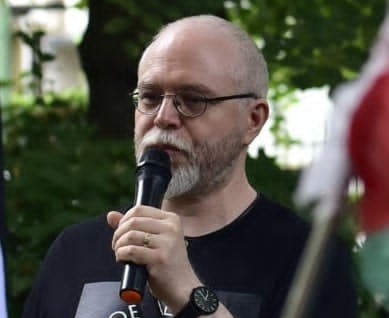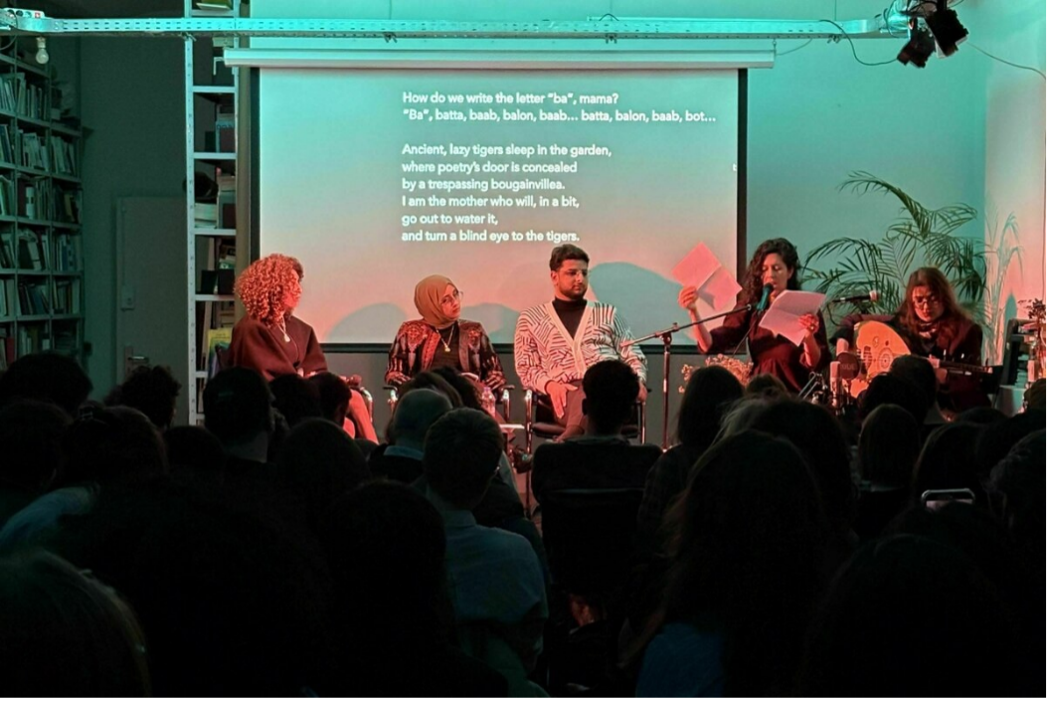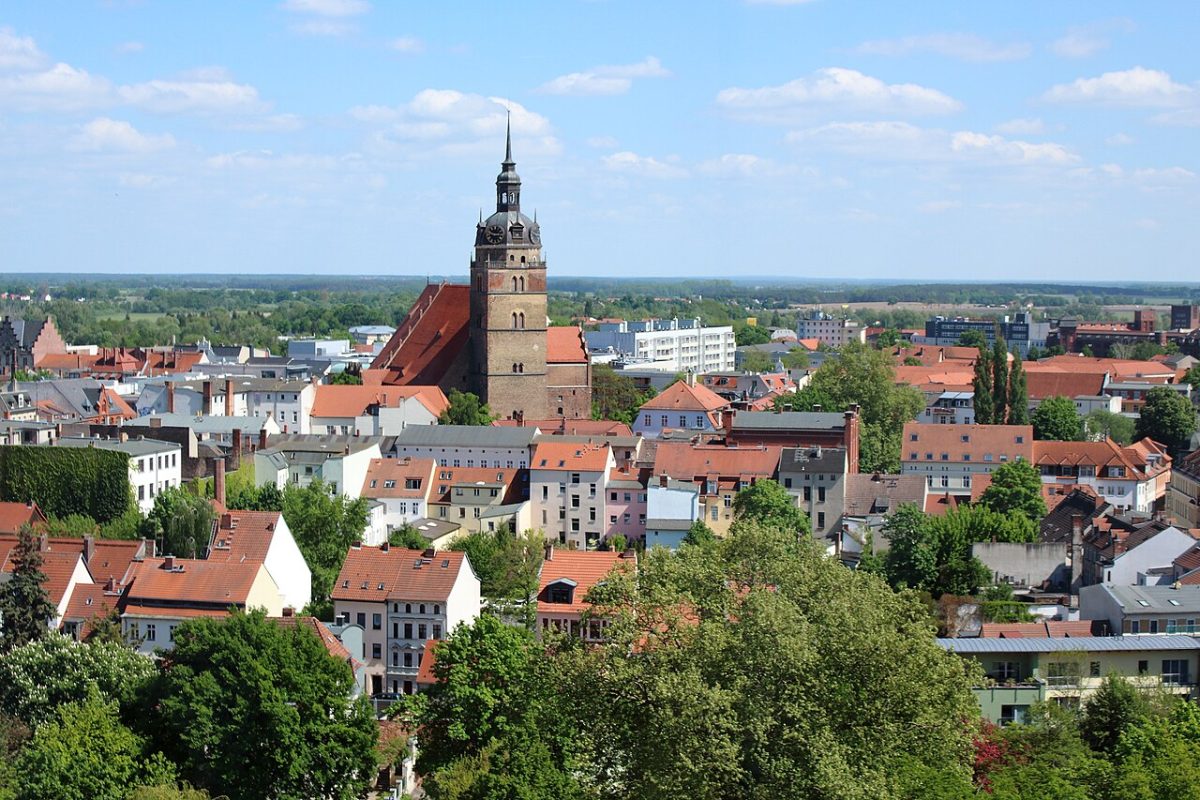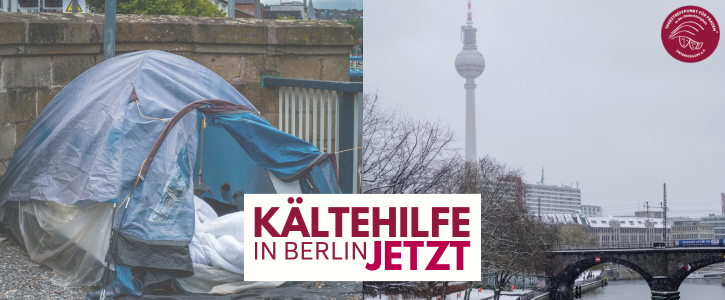Hi Wieland. Thanks for talking to us. Could you briefly explain who you are and what you do?
I’m a composer, translator and author, and chair of the ‘Jüdische Stimme’. A book of mine is coming out soon. It’s the paperback version of a book that came out at the end of last year in eBook format, with a different publisher, and a different title.
The book was originally published by Battleground books and was called “German Apartheid Politics”. The paperback edition is called “Germany’s Jewish Problem: Genocides Past and Present” and will be published by OR Books.
Which of the titles do you prefer?
I suppose they have a slightly different angle. The original title is maybe slightly more insider-directed. It touches on a lot of things, but doesn’t spell out exactly what we’re talking about. The word apartheid is about support for the apartheid state of Israel, but there is also apartheid in the unequal treatment of the Palestinians in Germany and their supporters.
I guess the paperback publisher felt that the title needed to be more obvious, to grab the reader. They’re a bigger publisher, so they think a bit more in this way.
“Germany’s Jewish Problem” is quite provocative, and is a formulation that could be used by someone with antisemitic intent. But this is a left wing publisher that has also brought out several books by Norman Finkelstein. So it’s clear that it’s about what’s problematic about the way Germany deals with Jews and Jewish history.
What slightly concerned me at first was that the Palestine connection is more hidden, but the subtitle of “Genocides Past and Present” touches on that. I think it’s a well chosen title. It’s a different flavour, different angle, but I think it works.
It is most definitely more provocative, for better or worse. Could you explain what you think Germany’s Jewish problem is?
Well, I wrote a whole book about it! But it’s a collection of articles written over more than four years. They all circle around the issue of Palestine-Israel, but also German perceptions of Jews, German perceptions of the whole Palestine issue, memory culture, and the ways this is connected with general racism. Experiences from my activist context also flow into that.
The book’s perspective is clearly located in Germany. That’s where I live and what I’m mainly commenting on. There are two articles focused purely on Palestine, because they’re about a trip I took there in 2022. But the rest are about German perceptions – the aftermath of the Holocaust and the near annihilation or exile of Germany’s Jewish population.
This created a huge gap in society that people may not immediately think about when they consider this huge mass murder. Of course, there was killing, there was violence, but there’s also this erasure, this very big gap, this lacuna that was left over.
Practically every synagogue you walk past is now a former synagogue. Some of them have been turned into museums, or maybe you can get a tour of them once a week. But Jewishness was erased as a presence that’s not just physical, but forms a part of the country’s culture and discourse.
Even with a government-initiated influx of Jews from post-Soviet countries. It’s been very difficult to establish any sense of normality in relations between Jews and non-Jews in Germany. There’s often a kind of over-compensation, a philosemitic approach to Jews.
The majority of people in Germany have rarely met Jews, unless they’ve been to the US. There are an estimated 225,000 Jews in Germany, so it’s very difficult to have a general sense of Jews as ordinary people who are part of the country’s population. Many people have an image frozen in time of Jews as the victims of the Nazis, who were the parents or grandparents of many Germans.
In some cases, this leads to an over-compensation which means that people want to have a particularly favourable idea of Jews. They make a point of doing what they think is supporting Jews. Including supporting Israel, going on holiday in Israel, or cultivating connections to Israel thinking this somehow revives Jewishness.
But Germany contains at least as many Palestinians as it does Jews. And Palestinian people are an unwanted and disturbing presence in the equation, because the very existence of these Palestinians is an indictment of Israel. Why are they in Germany in the first place? It’s because they’re exiled. They’re refugees or migrants.
The presence of so many Palestinians here is down to the injustice of the Nakba and then the occupation. This confronts those Germans who support Israel because they want to support Jews.
There’s a big tangle of things here, connected to a general racism, especially towards Palestinians. This reveals racism in areas where one maybe didn’t think that it was present.
To add to the entanglement: you’ve talked about the German government in the 90s encouraging Jewish migration from Eastern Europe. But another major case of Jewish migration to Germany is of Israelis. They are largely coming because they don’t want to live in Israel anymore. How do they fit in with the general experience?
That’s an interesting case because there’s something quite contradictory about it. In this idealization of Israel, the “only democracy in the Middle East”, Israel is meant to be a “protective space” for Jews, which is a phrase that makes me think of a nature reserve for Jews.
Or a safari park?
Yes. And you still find Germans talking about how Israel is necessary for the safety of Jews, which, of course, means that they’re not safe here. According to this view, we can only be safe by going to Israel. But Israel is clearly not a safe environment for anyone.
So people are coming from Israel, this supposed protective space, to Germany, which is supposedly unprotected, what does that say about this idea that Israel is protecting Jews? Because clearly they don’t want to be there anymore.
In some cases, that’s not for explicit political reasons. It’s easy for Israelis with German ancestors to get German citizenship, which then makes them EU citizens, and offers various advantages. And in urban Israel Tel Aviv or Jerusalem, the cost of living has got higher and higher. So in some cases, it’s more of a pragmatic, economically motivated decision than an escape from the political surroundings.
But of course, there are those of a more Leftist persuasion, including many members of Jüdische Stimme. They leave because they’re in conflict with that society, or because they see no future. Depending on how much Germans think about it, this could unsettle their narrative.
Then, when Israelis come to Germany, they realise fairly soon that Germans have this unnatural way of dealing with them, both as Jews and as Israelis. There are things that can be rather troubling, uncomfortable or just downright bizarre.
If they are in any way politically active or just move in political circles, they find Germans who are generally liberal, or even left of liberal, but who use language about Israel echoing the Israeli right wing and the way they talk about Palestinians. So many Israelis coming to Germany realize quite soon that they’re in a place that doesn’t deal with them in a normal way.
I moved to Berlin 20 years ago from Stuttgart, where there weren’t many Israelis at all. At the time, most Israelis who I met were musicians who said that they’d come to Berlin so they could play music. Some of them had wanted to play with Palestinian musicians in Israel. But few wanted to talk about Palestine, because that was “politics” and they’d left Israel to get away from politics. More recently, Israelis in Germany – at least in my circles – have been engaging more with Palestine. Is this just a subjective thing, or do you have a feeling that this is something which is happening in broader society?
That’s difficult to say. I guess I would have a similar kind of experience to you in terms of which Israelis I deal with. But certainly you still find Israelis in the culture scene who are critical of their government, and don’t want to live in Israel, but they also don’t want to deal with this in their art, or to talk about it all the time. I guess they don’t want to be reduced to that.
There’s also that expectation by people here that if they meet an Israeli, then immediately this Israeli should give their position on the so-called conflict. Sometimes one does encounter some resistance to and resentment of that. Among those who define themselves less overtly in political terms, there may be some discomfort, and a wish that they could just exist outside of this.
Let’s go back to Germany’s attitude towards Israelis and Jews. Do you think this is something that’s immutable, or can it change? Is it changing?
I think it can change. It’s difficult to say how long that will take and to what extent the change is occurring now. Because most of society isn’t really aware that there are Israeli or ex Israeli Jews who are opposed to their state at a fundamental level. Not just against the excesses of the Netanyahu government, but the whole ethnocratic Zionist project. To be fair, it is a relatively small proportion of the Israelis here who go that far in their analysis. Plenty have a more liberal view – the classic two-state mentality.
The dominant discourse in the media and politics is that to oppose the very nature of the Zionist project is at best an unjustified hatred of Israel and at worst antisemitism. This is put in the context of an irrational world view. It is viewed as completely different from, say, being against segregation in South Africa or the USA.
It’s common in politics to see religion as somewhat off limits, something that you’re not going to criticize politically. Because religion is based on a whole different belief system. It’s not about the kind of rational analysis we would apply with geopolitics. For most people, there’s a taboo on demonstrating outside a place of worship.
But the sad fact is that almost all Jewish institutions and organizations worldwide, including Germany, propagate Zionist politics. Some are more explicit and vehement in a very crude nationalist way. Others may be more liberal, subtle, and moderate, but are still ultimately contributing to this.
It’s hard to find a Jewish museum or an exhibition about some form of Jewish culture that doesn’t have sponsorship from the Israeli embassy, or the Israeli ministry for diaspora affairs. Or that doesn’t serve supposedly Israeli food in the interval (by which they generally mean Palestinian or Arab food like falafel and hummus).
It’s very difficult to find mainstream Jewish spaces that don’t have an implicit pro-Israel bias. Meaning something which excludes anti-Zionist, or even non-Zionist Jews. If you’re someone who goes to synagogues, there are prayers for Israel and its defenders, which means the IDF. So you’re sitting there praying for an army that’s committing genocide. What kind of politics is that? Is that a situation where we can say that religious institutions are off limits politically?
We know how in Western societies, people talk about mosques where they claim that radical and militant ideas are being preached by imams. But how should one politically or morally assess the fact that people are praying for the IDF in synagogues?
This is something that has to change in the long term. It is a long project, and not everyone is interested in it. Not all Jews are religious, and the ones who come here tend to be secular Israelis who are not really interested in religion. But I think for anyone who cares about Judaism or Jewishness in a broader sense, this is something that has to change.
We’re doing this interview with theleftberlin.com. Most, but not all, of our readers are neither German nor Jewish. What’s the role of our readers in this discussion?
I think they have the advantage of not having this German view on things. They haven’t grown up with mainstream indoctrination. So it’s often easier for them just to relate to Jews as normal people, and in many cases as migrants.
There’s a sense of migrant identity that comes in here. You have a mobile identity that makes it more natural for you to connect both personally and politically with other groups of people. This is something that you can see in Berlin. Without wanting to overly generalize, there’s a natural kinship or alliance.
In the left wing area of society, which is your readership, communities from migrant backgrounds are far better suited to really having normal and fruitful relationships with Jews than Germans are. Because they don’t have this baggage and they’ll often have similar insights as Jews about German society,
Most Jews you’ll meet here are white, Ashkenazi Jews. White Germans will feel able to speak to them about non-white people in the way they would speak to other whites. Some of them will assume that there is natural enmity between Jews and Muslims. They may feel free to make anti-Muslim comments in front of Jews, because they assume that there is agreement.
While those Jews aren’t on the receiving end of that racism, they will get quite a clear view of it. That will make them natural allies of those migrants who really are on the receiving end of that racism.
Where can people get hold of your new book?
It’s up for pre-order on the OR books website, and copies will start shipping in October. It won’t be available on the wider book market until April, because this is the way OR books do things. They sell directly for a while before handing it over to Amazon and all the other other retailers.
If you want to read the eBook version, that can be ordered and downloaded at most online stores. There’s a brief pause at the moment, and it’s currently only available at the Google Play Store because there’s a change of distributor, but from mid-September, it will be back in all mainstream online stores.
And you’ll let people know about that from your blog?
Sure.
What are you doing next? You just announced that you’ve got another book coming out. What’s that about?
This book is not about Germany. It’s called “After Zionism: Towards a New Jewish Left”, and will be published by Verso. When I chose that title, I was aware that this is a pretty bold claim to make. So I feel that I’m putting a certain pressure on myself to deliver some kind of vision.
It starts by taking a look at Zionism, not just in the sense of its political manifestation in Israel. But also in the ways of thinking sometimes even even among Jewish people who don’t really support the project. The critique is sharpened by insights from Palestinian thinkers like Ghassan Kanafani, Steven Salaita and Mohammed El-Kurd. It’s thinking about ways to overcome Zionism, not in the sense of just leaving it behind and moving on, but in defeating it. The same way as we fight against racism and fascism.
This is connected to various left Jewish traditions and histories, one famous example being Bundism. And uncovering things like the buried Arab-Jewish (Mizrahi) identity. Through fighting against Zionism, and drawing inspiration from various traditions, we can move forward to a left Jewish culture and politics. I’m not suggesting a sort of separatist movement. I’m suggesting something that’s very much part of a wider politics, part of the overall leftist struggle, but drawing on a particular kind of Jewish thought and practice.
I said before that Jewish institutions need to be overthrown, or at least eroded bit by bit. That’s something that’s also part of this vision. Maybe some would call this utopian, but it’s trying to push through the ruins of Zionism, and to bring together the wealth of progressive and diasporist thinking as an antidote to nationalism, reinforcing solidarity across all groups in society.
I think that’s the place to end this interview. I’m sure we’ll talk again about the new book when it’s nearer to publication. But thanks for talking to us, and good luck in all you’re doing.




